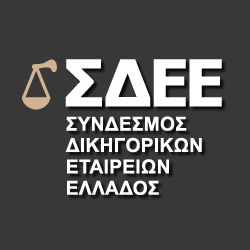Collaboration on the response prepared by Richard Sax,Manches and Mark Harper,Withers LLP, October 2005, on behalf of the English Fellows of the European Chapter of the International Academy of Matrimonial Lawyers
Tag: άρθρα (Page 3 of 3)
(Published in International Family Law Review, June 2004)
The continuous request of Lawyers’ Bar Associations and citizens from all over Greece for the establishment of Legal Aid for citizens of low income became on February 2004 integral part of Greece’s legal system.
According to Law 3226/2004, published in the Government Gazette on 4.2.2004, Legal Aid is granted to all citizens of the European Union as well as to citizens of third countries who have legally a permanent or a usual domicile in the European Union, in case their annual family income does not exceed the 2/3 of the lowest annual personal income provided by the National General Collective Working Agreement.
Procedure
The application must be supported by several certificates from State authorities evidencing the financial situation of the applicant and has to be submitted at least fifteen days before the trial. If successful, the applicant is granted Legal Aid covering all levels of jurisdiction including enforcement of any resulting order.
The local Bar Association makes out two lists of selected lawyers, one for penal matters and one for civil/commercial matters, on a monthly basis, and hands it over to the local Courts.
Granting Legal Aid
Legal Aid is granted in preliminary proceedings by the magistrate, the judge of the One Member Court of First Instance or the chairman of the court where the main application is to be heard. The court granting Legal Aid will determine the extent to which the litigation expenses (including the lawyer’s fees) will be covered.
Content of Legal Aid
Legal Aid in penal matters consists in the appointment of a defence counsel who is obligatory accepted by the person entitled. In civil/commercial matters it consists a) in the discharge from the obligation of the total or partial payment of the judicial expenses and b) in the appointment of an attorney, a Notary public and a process server with the mandate to help and represent the person entitled.
Out of borders
If the person asking for Legal Aid has his permanent or usual domicile in another country-member of the EU, the discharge may include also the remuneration of the interpreter, the expenses for the translation of documents and the travelling expenses. In this case the competent Authority will be the Ministry of Justice.
Resources
A special credit per year is registered in the budget of the Ministry of Justice for the compensation of the attorneys, Notary publics and process servers granting Legal Aid, according to the lowest provided specification limit of remuneration.
As a conclusion, one should mention that by the application of this new Law, the Greek legal system has made significant steps forward in relation to both legal and social issues of everyday life.
Religious Divorce in Greece by Haroula Constandinidou – International Family Law, April 2000 edition
(Published in International Family Law Review, April 2000)
No ecclesiastical divorce exists in Greece. However, for the religious marriages (which were the only possible marriages until 1982) the ecclesiastical authorities have always been involved in all stages of the divorce proceedings. The involvement of the ecclesiastical authorities in the preliminary stage of the divorce, enabling the establishment of the divorce proceedings, has now been abolished, although they still play a part in the main stage of the divorce, completing the divorce procedure.
Before the introduction of Law 1250/1982 (by which civil marriage was established in Greece), when only religious marriage existed, the procedure for divorce included two stages. The preliminary stage was an attempt at reconciliation by the competent ecclesiastical authority (articles 593 – 597 of the Greek Civil Procedure Code). Pursuant to the provisions of these articles, a divorce action was rejected by the court as unacceptable if a reconciliation attempt had not taken place. Therefore, before establishing court proceedings for divorce, the spouses had to file an application with the Bishop. During a 3-month period from the filing the Bishop could attempt to reconcile the spouses. If, within this period, the Bishop decided that the reconciliation was not feasible, or if the 3month period elapsed without any decision by the Bishop, then each of the spouses could file for divorce with the competent court.
The application for a reconciliation attempt was obligatory, if both spouses were Christian Orthodox, and only optional if they were of different denominations, or if one of the spouses was resident abroad. Today this stage has been abolished by virtue of art. 5 of Law 1250/1982.
The main stage of the divorce procedure takes place in court, resulting in the issue of an irrevocable judgement dissolving the marriage by divorce. The spiritual dissolution of the marriage (by the ecclesiastical authorities) was required for the completion of the divorce procedure. To this end the authorities (Archbishopric) issued a certificate, the “Diazefktirio”, without which no new marriage was possible. The Diazefktirio was issued prior to filing a pertinent application to this effect, along with other relevant documents (i.e. an irrevocable court decision for the dissolution of the marriage, a certificate issued by the Secretary of the court certifying that the divorce court decision was irrevocable and an order of the Public Prosecutor addressed to the Archbishopric for the spiritual dissolution of the marriage).
Since the introduction of Law 1250/1982, establishing civil marriage, there is still no church divorce. For religious marriages, although the preliminary stage of the reconciliation attempt before the Bishop has been abolished and the spouses can now directly file for divorce with the competent court, the completion of the main stage of the divorce procedure by the issue of the Diazefktirio is still necessary, and the same procedure as above is followed for the spiritual dissolution of the marriage. Without this procedure no new marriage can be celebrated.
(Published in International Family Law Review, November 1998)
In the past, the Greek Legislation relating to Nationality (L. 3370/1955 Greek Nationality Code: GNC) followed the principle of unity of the family’s nationality based on the husband’s Greek nationality. Accordingly, a non-Greek woman who celebrated a valid marriage with a Greek National acquired ipso jure Greek nationality (Art. 4 of the GNC) unless she declared before the wedding that she did not want to acquire Greek nationality (Art. 4 of the GNC). However, she could lose her Greek nationality, if she wished, within a year after her marriage, as long as she had retained her previous nationality (Art. 15 of the GNC).
The GNC was amended by Emergency Law 481/68. However, this law did not reflect on the principle of unity of the family’s nationality; that was accomplished by L. 1438/1984 and L. 1342/83 (which ratified the UN Convention of 1979 for the abolition of all forms of discrimination against women, Art. 9 para 1 of which provides that the signatory States confer to women equal rights with those of men regarding the acquisition, change and maintenance of their nationality), which brought radical changes to the issue of married women’s nationality. Indeed, thereafter, the principle of individuality or of nationality independence has been followed by Greek legislation (in conformity, moreover, with the requirement of the Greek Constitution for sex equality), and marriage does not bring with it the acquisition or loss of Greek Nationality (Art. 4 of the GNC as amended by L. 1438/1984 replacing Arts 4, 5, 16 and 22 of the GNC). As a result of the above, the non-Greek wife does not acquire her husband’s Greek citizenship because of her marriage to him; if she wishes to acquire Greek citizenship she has to follow the ordinary naturalisation procedure as does any other non-Greek resident. Of course, the same applies in the case of a non-Greek husband married to a Greek wife; he will have to follow the same naturalisation procedure.
One of the requirements of a naturalisation application used to be residency in Greece of 8 of the previous 10 years prior to the filing of the application, or 3-years’ residence in Greece after the declaration for naturalisation (Arts 6 and 7 of the GNC as replaced under no. 6 by Art. 3 of L. 1438/1984). Now, for non-Greeks, a total residency in Greece of 10 of the previous 12 years is required prior to the filing of the application for naturalisation, or 5 years’ residence in Greece after the declaration for naturalisation (Art. 14 of L. 2130/1993). According to the above, the non-Greek spouses of Greek citizens also had to meet the above residency requirement before they could acquire Greek citizenship by naturalisation.
Now, although the above requirement continues to apply for the naturalisation of a non-Greek, it does not apply for the naturalisation of the spouses of Greek citizens under certain conditions. More specifically, by L. 2503/1997 this requirement is abolished for non-Greek spouses of Greek citizens, as long as they reside in Greece and have children (Art. 14 addition to last subparagraph of case b, para 1, Art. 4 of L. 2130/1993).
(Published in International Family Law Review, May 1998)
Aiming at the shift of the resolution of the consequences of marital breakdown away from courtrooms, and in compliance with the European spirit that promotes amicable solutions (especially for the sake of children) Greek legislators have taken the first steps by enacting a compulsory attempt for conciliatory solutions in cases of parental care and communication rights, and financial disputes.
Parental care and communication rights
Article 681C para 2 of the Civil Procedure Code (as amended by Art 38 of Law 2447/96) provides for a compulsory preliminary procedure where there is a dispute as to the exercise of parental care rights during the marriage, in cases of divorce or nullity or for children born out of wedlock and/or the communication rights.
The compulsory preliminary procedure includes:
- a research stage by officers of the relevant social service as to the living conditions of the minor, and the subsequent submittance to the court of pertinent report analysis (accompanied where necessary by a psychiatrist’s report);
- an attempt by the judge to reach a conciliatory solution to the dispute by giving a formal interview to the minor, the litigants and their lawyers within a time-period of 8 days prior to the hearing of the case.
If the above requirements are not met the hearing cannot take place.
Financial disputes
Article 214A of the Civil Procedure Code (as it is replaced by Art. 6 para 2 of Law 2479/1997) provides for conciliatory solutions in private disputes where there are actions subject to the ordinary procedure of the multi-member court of first instance, and for which the substantial law allows the parties to reach a conciliatory arrangement. Such actions cannot be heard without a prior attempt by the parties to reach an arrangement (Art. 214A para 1). In family law such arrangements can apply to financial disputes concerning claims for participation in the acquisitions obtained by either spouse during the marriage.
Under the conciliatory procedure the respondent is summoned and has to appear at the office of the plaintiff’s lawyer on a certain day and time in order to reach a compromise solution to the dispute. The date of the meeting is fixed within the time-period from the tenth day after the service of the subpoena to the twentieth day before the day of the hearing (para 3). The litigants together with their lawyers (or represented by them), assisted if they wish by a third person of a common choice, meet to examine the dispute as a whole and any potential crossaction by the respondent, without being bound by the provisions of the substantial law. They can use all appropriate means to verify all critical events and the points of agreement or disagreement, as well as the accepted or disputed outcomes, in order to achieve a mutually acceptable solution to the dispute in whole or in part (para 4).
Where the litigants reach a solution to the dispute in whole or in part, a report is drawn in which are entered the subject-matter[s] of the agreement and especially the kind of acknowledged right[s], the performance due by the parties, and any potential terms as to the fulfilment of the agreement. The agreement is confined to the subject-matter of the legal dispute (para 5). Any of the litigants can ask the multi-member court of first instance to ratify the minutes of the agreement, and if certain requirements are met then the ratification of the report constitutes an enforceable title. If the report is ratified then the trial is set aside. If the ratification covers only part of the dispute then only that part is set aside (para 6).
Where the litigants fail to reach an agreement, a joint report of failure of the attempt is drawn and signed. If such a report is not drawn, the lawyers of each litigant draw a declaration to the same effect where they can also state the reasons for the failure to reach an agreement. The joint report or the declarations are filed together with the pleadings at the hearing of the case (para 7).
The action can proceed at a hearing only: (a) if the joint report or declarations show that the attempt to reach an agreement failed in all or in part; and (b) if a litigant refused to take part or did not appear to participate at the attempt (para 8).
Article 214A will come into force for actions filed from 16 September 1999 onwards.
(Published in International Family Law Review, February 1998)
The Hague Convention on the Civil Aspects of International Child Abduction, signed on 25 October 1980, was ratified by Greece on 2 December 1992 by virtue of law 2102/1992 and came into force on 1 June 1993.
According to the most recent statistics provided by the Greek Central Authority (Ministry of Justice) the number of the Hague Convention cases entered in Greece (through the Central Authorities) and heard by the Greek courts is 87 (33 in 1994, 25 in 1995, 22 in 1996 and in 1997).
The majority of the cases tried in the Greek courts have been the result of requests by the USA, Germany, the UK, Australia, Sweden and Canada. In these cases, approximately 6% of the applications ended in amicable settlements, while approximately 60% ended in judicial decisions ordering the child’s return.
The number of requests which Greece has made through its Central Authority to overseas authorities is 36 (seven in 1994, 13 in 1995, eight in 1996 and eight in 1997).
These have been made mainly to the UK, the USA and Germany. Approximately 5% of these cases ended in amicable settlements, while approximately 85% to 90% ended in judicial decisions dismissing the applications for the return of the child.
According to the information gathered from the Central Authority it seems clear that the Greek courts are inclined to issue judgements in accordance with the initial purpose of the Convention’s enactment, while Greece’s experience of overseas courts seems to make much more extensive use of the exceptions provided in Arts 12 and 13 of the Convention and dismiss applications for return.
(Published in International Family Law Review, November 1997)
Legal aid has become an integral part of many European countries’ legal systems. In Greece, however, the only assistance available until now has been by way of “poverty benefit” under Arts 194-204 of the Civil Procedure Code.
Poverty benefit, rarely used in practice owing to a number of disadvantages, is granted to applicants in extreme poverty. It can also be granted to foreign nationals on the basis of reciprocity. The benefit is granted in preliminary proceedings by the magistrate, judge of the One Member Court of First Instance or the chairman of the court where the main application is to be heard. The application must be supported by certificates from various authorities evidencing poverty. If successful, the applicant (who may be underrepresented) is granted poverty benefit covering all levels of jurisdiction including enforcement of any resulting order. The court granting the benefit will determine the extent to which the litigation expenses (including the lawyer’s fees) will be covered.
In practice, poverty benefit is confined to a very few extremely poor litigants, and its outreach is even further reduced by the reluctance of people to be characterised as paupers. There is clearly ample scope for improvement of the system from both a legal and social point of view.
With this end in view, the Athens Bar Association is pioneering a new system of legal aid for Greece. It has established a legal aid board offering guaranteed defence and assistance to defined categories of disadvantaged people (for example disabled or unemployed people, foreigners, financial and political refugees, pensioners on low incomes, and members of ethnic minorities, etc). Under the scheme, lawyers are appointed to represent citizens who fall within the above categories with the costs being met from a special account. A request has been made for Government support through relevant associations and unions, and funding of the special account. Fifteen trials have taken place under the scheme since it began in May 1997.






